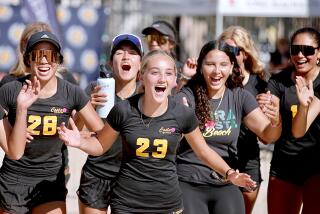Surfing Schoolboys Are Riding High in Huntington Beach
- Share via
Remember when surfing was a sport you could count on? You knew what surfers stood for, or what they wouldn’t stand for--shoes, rules, authority, haircuts, adults, school. Especially school.
For example, which of the following lyrics did the Beach Boys sing? Was it:
“Tell the teacher we’re surfin’, surfin’ U.S.A. . . . “
Or:
“We could do our homework together, while our love would grow-o-oh . . . “
In those old days, surfing and school were activities that went together about as well as smoking and pumping gas. A surfer’s worst nightmare would be to see, paddling out through the foam, with a whistle and clipboard, his high school gym coach.
The image of a high school surfer was the Sean Penn character in “Fast Times at Ridgemont High,” having a pizza delivered to him in the classroom.
Now look. Surfers go to school, and even study. It’s not an epidemic, but it’s a definite trend. Schools have surfing teams. In some places, at some schools, surfing and civilization have met one another halfway.
Prime example: Huntington Beach High School. The surfing Oilers are 107-3 in dual meets over the last six years. The student-surfers--there’s a weird phrase--can earn class credit for surfing, and even college scholarships.
Academically, the HBH surfers are the school’s highest-rated athletes. The new principal is pleasantly amazed.
“When I came here, I figured surfers were kids who would do anything to get out of school, who were not highly motivated,” says Principal Gary Ernst, who recently inherited this surfing dynasty. “But they’re good students, healthy looking kids and they’re good athletes.”
How did this bizarre situation come about? Seven years ago, the school lost its surfing team in the Proposition 13 cutbacks.
A man named Chuck Allen, the gray-haired vice president of a savings and loan, a surfer and former rodeo bull rider from Oklahoma, volunteered to help re-start the school surfing team.
“I’d never come across a sport that needed so much help,” Allen says. “Surfing had a bad image, and a lot of kids who got involved in surfing tried to live up to that image. We started with the purpose of tying scholastics to surfing. We wanted to clean up the image and bring coaching to the sport--discipline, conditioning, dieting, strategy.”
For unknown reasons, when Allen laid out this plan, the school’s surfers did not run screaming into the night. Maybe it’s because someone, an authority figure, was backing down from the old line and admitting that surfing was a legitimate sport, a worthwhile activity.
But enough moralizing. Allen and some other volunteer coaches soon whipped together a team that has become feared and respected by rival surfers and school administrators from Hawaii to the shores of Peru.
Each schoolday morning at 6:30, Allen’s surfing PE class, about 100 students, gathers at the Huntington Beach pier, a world surfing landmark. They limber up with calisthenics. They grab their boards and run a half mile down the beach, then they paddle into the water and around the pier. This is not the glamour side of surfing, especially not during a cold December rainstorm, but it pays off.
“In a (contest) heat, we’ll out-paddle anybody,” says Greg Ryan, one of the team’s stars. “At Ventura, where the surf is big, a lot of guys (from other teams) don’t even make it out for their four waves.”
When the HBH surfers finally get to surf during these morning workouts, the coaches actually coach, critiquing style and conducting drills to simulate contest conditions. The daily attendance rate is high, and there is a long waiting list for this class.
“I get here at 6 or 6:15 every morning,” Ryan says. “I couldn’t sleep ‘til 7 o’clock now if my life depended on it. I surf until 9:15 and I’m at school for my first class at 10, no problem.”
Every Friday morning, coach Allen’s surf class meets in an actual classroom, for lectures, surf films or guest speakers.
In his spare time, Allen badgers community businessmen for donations for team equipment, travel and scholarships. The scholarship fund is currently about $3,500 a year.
Allen and the other coaches, incidentally, work for nothing.
It’s a tough program to beat. At most other schools, the surfing team is a loose organization of individuals. At Huntington Beach, it’s a real team.
At the National Scholastic Surfing Assn. tournament this week at Huntington Beach, the HBH Oilers were the only entrants with their own team tent, team oranges, and team hibachi.
Monday morning at 6:30, Allen was mapping strategy, another HBH coach was evaluating HBH surfers after their heats, and still another aide was chopping onions, opening cans of chili and slicing pickles. Allen had brought a team jug of spring water.
Of course, the traditional surfer breakfast is beef jerky and Twinkies with a Coke. But this is a strange new age of surfing. They do things differently.
More to Read
Get our high school sports newsletter
Prep Rally is devoted to the SoCal high school sports experience, bringing you scores, stories and a behind-the-scenes look at what makes prep sports so popular.
You may occasionally receive promotional content from the Los Angeles Times.






